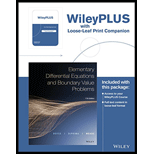
Elementary Differential Equations And Boundary Value Problems
11th Edition
ISBN: 9781119256007
Author: Boyce, William E.
Publisher: John Wiley & Sons, Incorporated
expand_more
expand_more
format_list_bulleted
Question
Chapter 1.3, Problem 1P
To determine
The order of the given differential equation and identify whether it is linear or non-linear.
Expert Solution & Answer
Want to see the full answer?
Check out a sample textbook solution
Students have asked these similar questions
Please give a handwritten solution without use of AI
Q4)
(i) Calculate the fourier transform of :
h(t)
2T
(is) h(t)
2T
-T
о
T
2T
·(-++T). cos2t ost≤T
(iii) hro (4) ((-++T). cos
otherwise
1. Sketch the following piecewise function on the graph. (5 points)
x<-1
3
x²
-1≤ x ≤2
f(x) =
=
1
४
| N
2
x ≥ 2
-4-
3
2
-1-
-4
-3
-2
-1
0
1
-1-
--2-
-3-
-4-
-N
2
3
4
Chapter 1 Solutions
Elementary Differential Equations And Boundary Value Problems
Ch. 1.1 - Prob. 1PCh. 1.1 - Prob. 2PCh. 1.1 - Prob. 3PCh. 1.1 - Prob. 4PCh. 1.1 - Prob. 5PCh. 1.1 - Prob. 6PCh. 1.1 - Prob. 7PCh. 1.1 - Prob. 8PCh. 1.1 - Prob. 9PCh. 1.1 - Prob. 10P
Ch. 1.1 - Prob. 11PCh. 1.1 - Prob. 12PCh. 1.1 - Prob. 13PCh. 1.1 - Prob. 14PCh. 1.1 - Prob. 15PCh. 1.1 - Prob. 16PCh. 1.1 - A pond initially contains 1,000,000 gal of water...Ch. 1.1 - Prob. 18PCh. 1.1 - Newtons law of cooling states that the temperature...Ch. 1.1 - Prob. 20PCh. 1.1 - Prob. 21PCh. 1.1 - Prob. 22PCh. 1.1 - Prob. 23PCh. 1.1 - Prob. 24PCh. 1.1 - In each of Problems 22 through 25, draw a...Ch. 1.2 - Prob. 1PCh. 1.2 - Prob. 2PCh. 1.2 - Prob. 3PCh. 1.2 - Prob. 4PCh. 1.2 - Undetermined Coefficients. Here is an alternative...Ch. 1.2 - Use the method of Problem 5 to solve the...Ch. 1.2 - Prob. 7PCh. 1.2 - Prob. 8PCh. 1.2 - Consider the falling object of mass 10 kg in...Ch. 1.2 - Prob. 10PCh. 1.2 - Prob. 11PCh. 1.2 - According to Newton’s law of cooling (see Problem...Ch. 1.2 - Prob. 13PCh. 1.2 - Prob. 14PCh. 1.3 - Prob. 1PCh. 1.3 - Prob. 2PCh. 1.3 - Prob. 3PCh. 1.3 - Prob. 4PCh. 1.3 - Prob. 5PCh. 1.3 - Prob. 6PCh. 1.3 - Prob. 7PCh. 1.3 - Prob. 8PCh. 1.3 - Prob. 9PCh. 1.3 - Prob. 10PCh. 1.3 - Prob. 11PCh. 1.3 - Prob. 12PCh. 1.3 - Prob. 13PCh. 1.3 - Prob. 14PCh. 1.3 - Prob. 15PCh. 1.3 - Prob. 16PCh. 1.3 - Prob. 17PCh. 1.3 - Prob. 18PCh. 1.3 - Prob. 19PCh. 1.3 - Prob. 20PCh. 1.3 - Prob. 21PCh. 1.3 - Prob. 23PCh. 1.3 - Prob. 24P
Knowledge Booster
Similar questions
- Please give a handwritten solution without use of AIarrow_forwardPlease solve handwritten, without use of AIarrow_forwardUse Euler's method with step size h = 0.1 to approximate the solution to the initial value problem y' = x - y², y(3) = 0, at the points x = 3.1, 3.2, 3.3, 3.4, and 3.5.arrow_forward
- 2. Let f(x) = 2x² + 6. Find and completely simplify the rate of change on the interval [3,3+h]. (5 points)arrow_forwardQ4. a) A periodic waveform f(t) is shown in Figure 2 f(t) Vo Figure 2 T with f(t+mT) = f(t) and m is an integer. Also, V₁ = 3, t = 1, T = 2. (i) (ii) Derive the formulae for the complex Fourier coefficients c for f(t). Sketch the amplitude spectrum of ƒ (t) (including the components up to n = ±3).arrow_forwardPLease solve handwritten, dont use AI.arrow_forward
- please solve the question handwritten without AIarrow_forwardCan you explain this statement below in layman's terms? Secondary Analysis with Generalized Linear Mixed Model with clustering for Hospital Center and ICUvs Ward EnrolmentIn a secondary adjusted analysis we used generalized linear mixed models with random effects forcenter (a stratification variable in the primary analyses). In this analysis, the relative risk for the primaryoutcome of 90-day mortality for 7 versus 14 days of antibiotics was 0.90 (95% Confidence Interval [CI]0.78, 1.05).arrow_forward2 Solve for (x, y, z) in the set of linear, inhomogeneous equations: 2x+5y + z = 2 x+y+2x=1 2+52=3.arrow_forward
- Prove by induction that for any natural number N, 1 N Σ42 = 6 N(N + 1)(2N + 1). k=1 Indicate clearly where you use the inductive hypothesis.arrow_forward2x-y=1 x+2y=7 y = 2x + 2 3x + 2y = 4 x+3y=0 x-3y=6 8 4x-2y=7 x + 3y = 7 10 2x-2y=5 2x + 3y+ 1 = 0 Ke int lin Chapter 14arrow_forward(a) (b) Let A, B be disjoint subsets of a set X. Show that AC Bc. Use proof by contradiction to show that for any a, b = R, if a is rational and b is irrational then ba is irrational.arrow_forward
arrow_back_ios
SEE MORE QUESTIONS
arrow_forward_ios
Recommended textbooks for you
 Discrete Mathematics and Its Applications ( 8th I...MathISBN:9781259676512Author:Kenneth H RosenPublisher:McGraw-Hill Education
Discrete Mathematics and Its Applications ( 8th I...MathISBN:9781259676512Author:Kenneth H RosenPublisher:McGraw-Hill Education Mathematics for Elementary Teachers with Activiti...MathISBN:9780134392790Author:Beckmann, SybillaPublisher:PEARSON
Mathematics for Elementary Teachers with Activiti...MathISBN:9780134392790Author:Beckmann, SybillaPublisher:PEARSON
 Thinking Mathematically (7th Edition)MathISBN:9780134683713Author:Robert F. BlitzerPublisher:PEARSON
Thinking Mathematically (7th Edition)MathISBN:9780134683713Author:Robert F. BlitzerPublisher:PEARSON Discrete Mathematics With ApplicationsMathISBN:9781337694193Author:EPP, Susanna S.Publisher:Cengage Learning,
Discrete Mathematics With ApplicationsMathISBN:9781337694193Author:EPP, Susanna S.Publisher:Cengage Learning, Pathways To Math Literacy (looseleaf)MathISBN:9781259985607Author:David Sobecki Professor, Brian A. MercerPublisher:McGraw-Hill Education
Pathways To Math Literacy (looseleaf)MathISBN:9781259985607Author:David Sobecki Professor, Brian A. MercerPublisher:McGraw-Hill Education

Discrete Mathematics and Its Applications ( 8th I...
Math
ISBN:9781259676512
Author:Kenneth H Rosen
Publisher:McGraw-Hill Education

Mathematics for Elementary Teachers with Activiti...
Math
ISBN:9780134392790
Author:Beckmann, Sybilla
Publisher:PEARSON


Thinking Mathematically (7th Edition)
Math
ISBN:9780134683713
Author:Robert F. Blitzer
Publisher:PEARSON

Discrete Mathematics With Applications
Math
ISBN:9781337694193
Author:EPP, Susanna S.
Publisher:Cengage Learning,

Pathways To Math Literacy (looseleaf)
Math
ISBN:9781259985607
Author:David Sobecki Professor, Brian A. Mercer
Publisher:McGraw-Hill Education